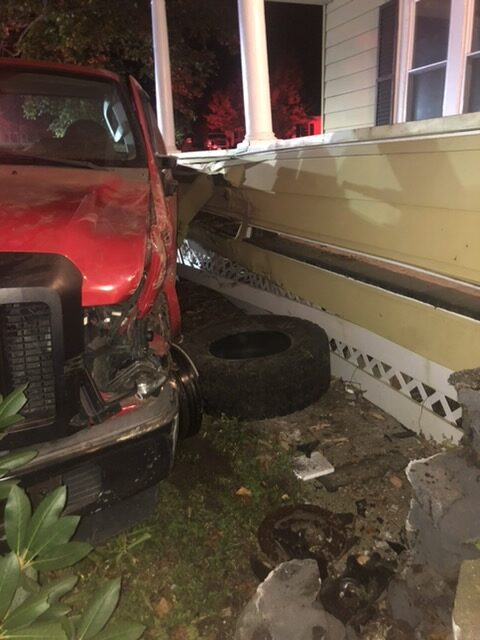What happens when a 20 year old gets drunk, crashes into a house at 3 o’clock in the morning, attempts to flee, refuses the lawful orders of the police, and causes severe injury to the Massachusetts Police Officer on the scene by resisting his arrest? Does that man, his insurance company, and their lawyers take responsibility for his actions and do the right thing? In America? Of course not. What followed was years of denial, claims of unwarranted police brutality, and ultimately an officer standing tall and being fully vindicated by a Massachusetts jury. This is that story.
On the night of Allan Mast’s 20th birthday, he went out to dinner with his family then to a bonfire with friends where he drank and smoked himself into oblivion. Instead of calling an Uber, cab or sleeping it off, he climbed into his 7,000-pound F-250 to attempt the 40 minute drive home. Within minutes he drove off the road, glanced a tree, and slammed into a porch before his truck was stopped by stone front steps. Mast tried to drive away but his truck was stuck. Unfortunately for him, the house he hit belonged to local officer Brian Shaw. Sgt. Shaw came down to render aide and found a man trying to escape. After Mast failed to follow repeated commands to shut the truck off and get out, including those ordered with a badge and gun in plain view, Sgt. Shaw went into the cab and pulled the keys out. Why Mast refused to get out and what weapons he may have within reach were unknown to Sgt. Shaw. When Mast still would not get out, Shaw went in to get him. Mast swung, striking Shaw with a glancing blow to the head. Shaw delivered one punch to Mast’s jaw then pulled Mast out of the truck. The force required to extricate Mast’s 250-pound frame tore tendons in Sgt. Shaw’s dominant right hand. Sgt. Shaw successfully ended that threat but suffered injuries that also ended his career.
Mast was charged and admitted to driving offenses including drunk driving but was never charged with resisting arrest or assault and battery. Sgt. Shaw hired us to pursue his substantial losses including the loss of his income and the pain and suffering related to the surgeries in his hand and the loss of his career that he worked his life to attain. Mast and his attorneys denied he did anything wrong that caused Shaw’s injuries. They claimed once the keys were out of the ignition and the vehicle could not move, the emergency was over and there was no basis for Sgt. Shaw to pull Mast out. Further, Mast denied striking Sgt. Shaw or resisting in any way. Mast claimed Sgt. Shaw was angry his house was hit and it was Sgt. Shaw that punched Mast first when Mast was simply sitting passively then dragged him out thereby causing his own injury due to his own brutal overreaction. The defense retained a police procedures expert to support this position. Ultimately, the most the insurer would ever officer Sgt. Shaw was $125,000 to settle his claims, less than 1/15 the ultimate verdict.
The jury in this case heard the same Monday morning quarterbacking arguments that follows every instance like this. A police officer enters a dangerous situation and brings it to a close at grave risk to him or herself sometimes suffering irreparable harm and the aftermath is a flurry of questions of why they did not do x, y, or z. Why not wait for backup? You had your cell phone why not call first? How long would that have taken? You could have waited and controlled Mast with the threat of your gun so why not just wait for backup? What would have happened? Everyone agreed these were options. Their expert, Sgt. Shaw, our expert, and members of his own department had to agree. Of course, those were options. What the defense failed to appreciate that the jury and we understand is that is not what policing and the law surrounding it is about. Further, the sad reality is that assaults and shootings of local police officers have become more frequent nationwide in recent years.
The question for this jury according to us and ultimately the presiding judge was not whether the jury or most people would do what Sgt. Shaw did under those circumstances. Most people would not. We are not all blessed with Sgt. Shaw’s ability and bravery. Nor was it about whether another officer would have done what Sgt. Shaw did in the same circumstance. Not all of them would have. The question was simply whether Sgt. Shaw acted reasonably. The truth we all know is that he acted valiantly and is deserving of our deepest admiration. The jury saw through the defense’s benefit of hindsight arguments and returned a resounding verdict of $1,500,565, as well as concluding that Sgt. Shaw did nothing which contributed to causing his own injuries. The verdict was increased with prejudgment interest to $1,949,652.87, which is over 15x the insurer’s highest offer.
If you or any Massachusetts Police Officer you know has suffered an injury on the job, please contact us for a free and confidential consultation.
To protect the privacy of the officers and witnesses, all names and places have been changed. Any resemblance to names of real persons, past or present, is merely coincidental and not intended. The officers agreed to have this article published so police officers around the Commonwealth can be better educated about their legal rights to compensation when injured on duty.


